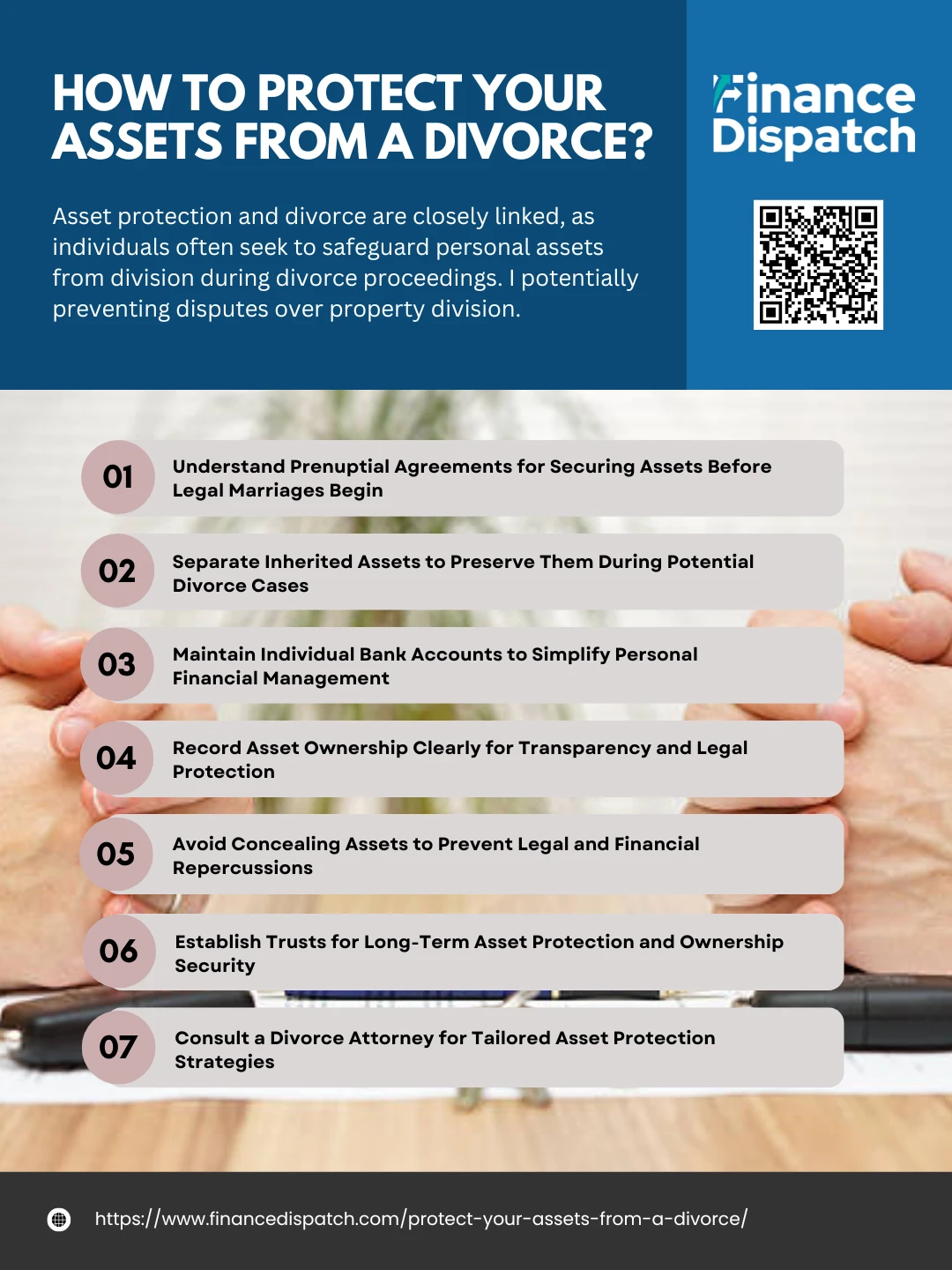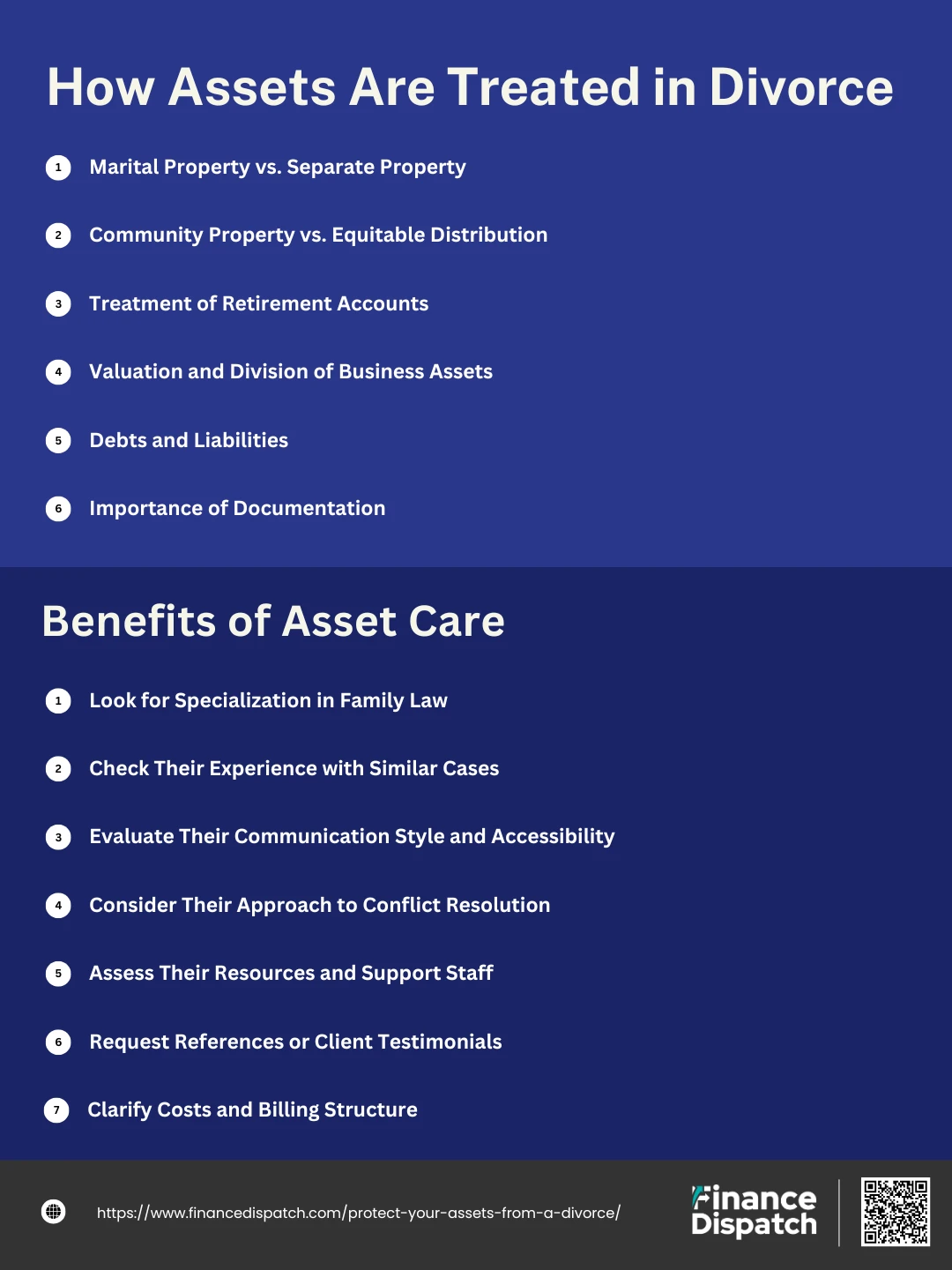Protecting your assets in the event of a divorce requires proactive planning and informed decision-making. While no one anticipates the end of a marriage, understanding and implementing asset protection strategies can ensure your financial stability and prevent unnecessary losses. From legal agreements to smart financial habits, there are steps you can take to shield what’s rightfully yours.
Here’s how to protect your assets during a divorce:

1. Consider a Prenuptial or Postnuptial Agreement
Prenuptial agreements, made before marriage, and postnuptial agreements, created after marriage, allow couples to outline how their assets should be divided if they divorce. These agreements specify which assets are considered separate property and how shared assets or financial responsibilities will be handled. By legally defining these aspects ahead of time, prenuptial and postnuptial agreements help avoid disputes and ensure both parties understand their financial boundaries. To ensure the agreement is valid, both parties should consult independent legal counsel, and full financial disclosure is necessary.
2. Keep Inherited Assets Separate
In most cases, inheritances received by one spouse are considered separate property, meaning they don’t have to be divided in a divorce. However, if inherited funds are deposited into a joint account or used for joint purchases—such as a down payment on a family home—they may lose their “separate” status and be classified as marital property. To protect inheritances, it’s essential to keep them in a separate account and avoid using them for marital expenses or investments. Documentation showing the funds’ origins as inherited assets is also helpful for verification.
3. Establish Individual Bank Accounts
Keeping individual bank accounts allows for a clear separation of personal and marital funds. If you are concerned about protecting your assets, avoid commingling them with joint funds in shared accounts. Instead, direct your salary and any personal investments to individual accounts that only you control. This practice not only helps protect separate property but also ensures that funds designated for personal use remain exclusively yours, simplifying the asset division process in the event of divorce.
4. Document All Assets
Keeping thorough and organized records of all assets, including property acquired before and during the marriage, is vital for asset protection. Documentation such as bank statements, investment records, property deeds, and receipts helps distinguish between marital and separate property, which can be essential if disputes arise. Additionally, documenting the date and source of asset acquisition can clarify claims to separate property, particularly if assets have increased in value or were supported by marital funds.
5. Avoid Transferring or Hiding Assets
Attempting to transfer or conceal assets to avoid division is generally prohibited and can result in legal consequences. If discovered, hidden assets may lead the court to penalize the spouse attempting to shield them by awarding a larger share of marital assets to the other spouse or imposing fines. Instead, consult with a divorce attorney to develop legal strategies for protecting your assets. Transparent handling of finances demonstrates good faith and protects your interests within the boundaries of the law.
6. Consider Setting Up a Trust
Trusts can offer a strong layer of asset protection, especially if established well in advance of divorce proceedings. An irrevocable trust, for example, allows you to transfer assets to a trustee for the benefit of designated beneficiaries, removing these assets from your direct ownership. Since the trust legally controls the assets, they are often shielded from division in divorce settlements. A domestic asset protection trust (DAPT) is another option that can protect personal assets from claims. Consulting with an estate planning attorney can help determine if setting up a trust is suitable for your specific needs.
7. Consult a Divorce Attorney
Working with a knowledgeable divorce attorney is essential for protecting your assets in a divorce. Divorce laws vary by state, and an experienced attorney can help you understand how these laws apply to your assets, ensuring you follow legal guidelines for asset protection. They can also recommend strategies specific to your situation, negotiate on your behalf, and guide you through any necessary legal steps. A trusted attorney’s expertise can be invaluable for securing your financial interests and ensuring a smoother, fairer divorce process.

How Assets Are Treated in Divorce
When a marriage ends, one of the most crucial steps in the divorce process is understanding how your assets will be categorized and divided. Each state has specific laws governing the treatment of marital and separate property, which determine what assets are subject to division. Knowing these distinctions and how courts handle asset distribution can empower you to take steps toward protecting what you own. Here’s how assets are generally treated in divorce:
1. Marital Property vs. Separate Property
In divorce proceedings, a primary distinction is between marital and separate property. Marital property refers to any assets or income that either spouse acquired during the marriage. This includes the family home, cars, income, retirement savings, and any jointly held accounts. Separate property, on the other hand, includes assets that one spouse owned before marriage, as well as gifts or inheritances received individually during the marriage. However, separate assets can easily become marital property if they’re mixed, or “commingled,” with marital assets. For instance, if inheritance money is deposited into a joint account or used toward a marital home, it may be considered part of the marital estate. Clear documentation is critical to distinguishing and preserving separate property in the event of divorce.
2. Community Property vs. Equitable Distribution
State laws govern how assets are divided during a divorce, and these laws generally follow either a community property or equitable distribution model. In community property states like California and Texas, marital assets are treated as jointly owned and are typically split 50/50 in divorce proceedings. Conversely, equitable distribution states consider fairness rather than strict equality. Factors such as each spouse’s financial contributions, future earning potential, and roles within the marriage are weighed to reach a distribution that is “equitable,” though not necessarily equal. This means one spouse could receive a larger share based on factors like financial needs or earning capacity.
3. Treatment of Retirement Accounts
Retirement accounts, including 401(k)s, IRAs, and pensions, are generally regarded as marital property if contributions were made during the marriage. To divide retirement accounts in a divorce, a court may issue a qualified domestic relations order (QDRO), a legal decree that outlines each spouse’s entitlement. The QDRO allows a portion of the retirement funds to be transferred to the other spouse without tax penalties. However, funds contributed to retirement accounts before the marriage are often classified as separate property. Documentation of pre-marital contributions can be essential to prevent these from being split as marital assets.
4. Valuation and Division of Business Assets
When one spouse owns a business, its value and any appreciation during the marriage can be subject to division in divorce. If the spouse’s contributions or shared income supported the business, it could be considered part of the marital estate. Courts often require a professional appraisal to determine the business’s value. Depending on the circumstances, the court may allocate a portion of the business value to the other spouse, allow the business owner to “buy out” their partner’s share, or even order the sale of the business. If you’re concerned about protecting business assets, consider preemptive measures like prenuptial agreements or careful documentation of separate property claims.
5. Debts and Liabilities
Marital debt, like marital property, is generally subject to division. Liabilities such as mortgages, personal loans, and credit card balances incurred during the marriage are often shared. Community property states may split these debts 50/50, while equitable distribution states may divide them according to each spouse’s ability to pay and their role in accumulating the debt. Separate debts, such as student loans taken out before marriage, typically remain with the spouse who originally incurred them. Documenting the origin and purpose of each debt can be helpful in establishing its classification.
6. Importance of Documentation
Detailed records are invaluable in asset protection during divorce. Courts rely on documentation to determine which assets and debts are marital versus separate property. This includes records of bank accounts, appraisals, receipts for valuable purchases, and statements showing account balances before and during the marriage. Clear documentation can provide evidence to support claims over separate property, minimizing disputes. In situations where marital and separate funds have been mixed, this paperwork can clarify each party’s contributions and help ensure fair division.
Guide to Hiring a Skilled Family Lawyer
Hiring a skilled family lawyer is one of the most important steps you can take to protect your interests during a divorce. A knowledgeable lawyer will help you understand your rights, advocate on your behalf, and guide you through the complexities of family law to secure the best possible outcome. Here’s what to consider when selecting the right family lawyer for your case:
1. Look for Specialization in Family Law
Family law is a specialized field, covering areas like divorce, asset division, child custody, and support arrangements. Look for a lawyer whose practice focuses primarily on family law. Their specialized knowledge and experience in navigating the complexities of family law will be critical in addressing your unique needs effectively.
2. Check Their Experience with Similar Cases
Not all family law cases are the same, and your case might require specific expertise. For instance, if you own a business or have significant assets, look for a lawyer with experience handling complex property division. In cases involving high-conflict custody, seek someone skilled in sensitive negotiations and litigation.
3. Evaluate Their Communication Style and Accessibility
Divorce and custody issues can be emotionally charged and time-sensitive. A good family lawyer should be not only responsive but also able to explain complex legal issues in clear, straightforward terms. During your initial consultation, assess their ability to listen, respond to questions, and make you feel comfortable.
5. Consider Their Approach to Conflict Resolution
Family law matters often benefit from alternative dispute resolution methods, such as mediation or collaborative law, which can save you time and stress. If you’re interested in an amicable resolution, look for a lawyer who supports these approaches and has a track record of settling cases outside the courtroom.
6. Assess Their Resources and Support Staff
Family law cases can involve extensive documentation, from financial statements to court filings. A lawyer with a strong support team, including paralegals and administrative staff, can ensure the smooth handling of paperwork and deadlines. This support is especially crucial if your case is complex or involves multiple assets.
7. Request References or Client Testimonials
Don’t hesitate to ask for references or check online reviews to get a sense of past clients’ experiences. Positive testimonials about how a lawyer handled similar cases, communicated with clients, and provided reliable representation can give you confidence in your choice.
8. Clarify Costs and Billing Structure
Family law cases can be costly, so it’s essential to understand a lawyer’s fees and billing structure upfront. Some may charge hourly, while others offer flat fees for specific services. Be sure to clarify any additional costs, such as filing fees or charges for support staff, to avoid surprises down the line.
What’s the Best Type of Asset Protection Trust for a Divorce?
An asset protection trust can be a powerful tool for safeguarding assets during a divorce, especially if established well in advance. These trusts provide a legal barrier between personal assets and potential claims by a spouse. Choosing the right type of trust depends on factors like the nature of the assets, the jurisdiction, and long-term goals. Here’s a comparison of some popular asset protection trusts and their effectiveness in a divorce:
| Trust Type | Description | Best for | Key Benefits | Considerations |
| Domestic Asset Protection Trust (DAPT) | Established in specific states, allows individuals to set aside assets beyond a spouse’s reach. | U.S. residents in DAPT-friendly states (e.g., Nevada, Delaware) | Protects assets from divorce and creditors | Must be created well in advance; not all states recognize DAPTs |
| Irrevocable Trust | A trust that cannot be altered once established, placing assets outside of direct ownership. | High-value, long-term assets (e.g., real estate, investments) | Strong protection as assets are no longer personally owned | Inflexible; assets cannot be reclaimed |
| Spendthrift Trust | Limits the beneficiary’s control, protecting assets from their creditors or divorce claims. | Heirs prone to financial risks or high-conflict divorces | Protects assets from both divorce and irresponsible spending | Beneficiary’s access is limited |
| Offshore Trust | Set up in foreign jurisdictions with strong asset protection laws (e.g., Cayman Islands). | High-net-worth individuals seeking maximum privacy | Highest level of protection from foreign jurisdictional laws | Requires careful compliance with international tax laws |
| Discretionary Trust | Allows trustee discretion over disbursements, protecting assets from forced division. | Protecting family assets intended for specific purposes | Provides control over disbursements to avoid asset commingling | Beneficiaries cannot demand specific distributions |
| Revocable Living Trust | A trust that can be modified or dissolved by the creator; often used for estate planning. | Estate planning and avoiding probate rather than divorce | Flexible and allows for asset management during life | Does not protect assets in divorce as assets are still accessible |
Conclusion
Navigating divorce is challenging, but with the right strategies and a focus on transparency, fairness, and planning, you can protect your financial future and lay the groundwork for a secure life ahead. From understanding asset division laws to seeking professional guidance, each proactive step empowers you to rebuild with confidence. Ethical actions, full disclosure, and adherence to legal requirements not only support a fair outcome but also demonstrate integrity throughout the process. By staying informed and making thoughtful decisions, you can successfully transition into a new chapter with stability, resilience, and peace of mind.



